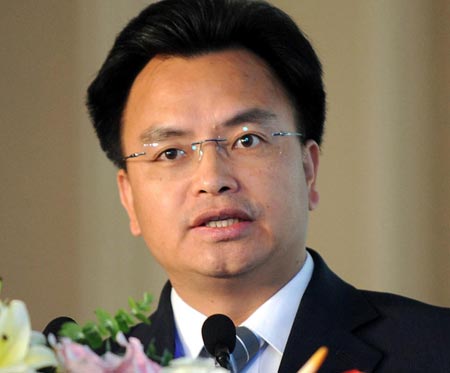Ongoing corruption investigations have netted two more “tigers” for President Xi Jinping: Guangzhou Party Chief Wan Qingliang and Xu Jie, former deputy chief of the State Bureau for Letters and Calls. Chris Buckley at the New York Times reports on the official announcement of the investigation into Wan’s alleged misdeeds:
Mr. Wan was the mayor of Guangzhou, long known as Canton in English, from 2010 to 2011, when he became the city’s party secretary, a more powerful post in China, where party rank is all-important. Mr. Wan also sat on Guangdong’s Standing Committee, the party body that steers the province and its 106 million people.
As is almost always the case when such inquiries are first announced, the party’s anticorruption agency, the Central Commission for Discipline Inspection, issued a single-sentence statement about Mr. Wan’s downfall.
“Wan Qingliang is suspected of grave violations of discipline and the law, and is now under investigation by the organization,” the commission said on its website. It gave no details of his alleged misdeeds.
In China, party investigations into corruption usually precede any legal inquiry, so party leaders decide whether to subject a fallen official to criminal trial and punishment. [Source]
The South China Morning Post has more on Wan’s background:
Wan built a career as a propaganda official in Guangdong’s Meizhou city, the hometown of famed communist general and state leader Ye Jianying. Ye’s family is believed to retain political influence in the city and beyond even after Ye died in 1983.
Wan made his last public appearance yesterday afternoon, touring a district in the city, accompanied by local officials.
A report of the tour landed on the front page of today’s Guangzhou Daily, the municipal party committee’s official newspaper.
At another meeting yesterday as part of an ongoing “mass line” campaign initiated by President Xi Jinping, Wan urged local officials to better discipline themselves and their relatives, according to a Southern Metropolis Daily report today. [Source]
Zachary Keck at the Diplomat points out that Wan is the second associate of former President Hu Jintao’s to be targeted for investigation:
More significantly, Wan is an ironclad member of the Communist Youth League or Tuanpai political faction, which is the power base of former President Hu Jintao. Wan served as the secretary of the Chinese Communist Youth League in Guangdong province from 2000 and 2003. During the second term of Hu’s presidency, Wan—then deputy governor of Guangdong province— was the youngest of a number of Tuanpai faction members occupying top party and government posts in Guangdong province.
Even today, the party chief of Guandong province, Hu Chunhua or “Little Hu,” is seen as a protégé of former President Hu.
The decision to target Wan for corruption may therefore be a sign that President Xi is seeking to curb the influence of former President Hu. As I noted after the leadership transition in November 2012, despite the apparent defeat Hu suffered at the 18th Party Congress, the former president was well positioned to dominate the selection of the 6th generation leaders that will assume power from President Xi and Premier Li Keqiang in 2022. There have also been some reports that former President Hu and former President Jiang Zemin have begun pushing back against Xi’s anti-corruption campaign. Thus, President Xi has ample reason to want to reduce Hu Jintao’s influence in the Party. [Source]
Earlier this month, it was revealed that Ling Zhengce, brother of Hu Jintao aide Ling Jihua, was being investigated for graft.
In another major corruption case, Xu Jie, former deputy chief of the State Bureau for Letters and Calls, has been expelled from the party for alleged bribery, adultery, and other wrongdoing. From the Xinhua announcement:
Investigations found that Xu, former deputy chief of the State Bureau for Letters and Calls, took the advantage of his post to seek profits for other individuals and organizations, asked and accepted a huge amount of bribe, said a statement from the Central Commission for Discipline Inspection (CCDI) of the CPC. [Source]
And from Reuters:
The party’s anti-graft watchdog said Xu Jie, who was deputy head of the State Bureau for Letters and Calls, was responsible for a series of cases involving the bureau “severely violating party discipline and the law”.
An investigation found that Xu abused his position by demanding and receiving a large amount of bribes, it said in a statement released in its website. Xu is also an adulterer, the watchdog added, without providing details.
Party officials are supposed to be morally upstanding and can be punished for morality problems, like adultery.
Xu will be handed over to judicial authorities and be dealt with “in accordance with the law”. [Source]
Read more about China’s petitioning system, through which residents of provinces can travel to Beijing to lodge formal complaints that their local officials have been unwilling or unable to resolve. The system has been criticized following the reported abuse of petitioners, who have been illegally detained or harassed by local officials who travel to Beijing to intercept them.
Earlier this week, Xinhua reported that Su Rong, the vice-chairman of the Chinese People’s Consultative Conference, had been sacked following a graft investigation. Read more about Xi Jinping’s anti-corruption campaign, via CDT.








